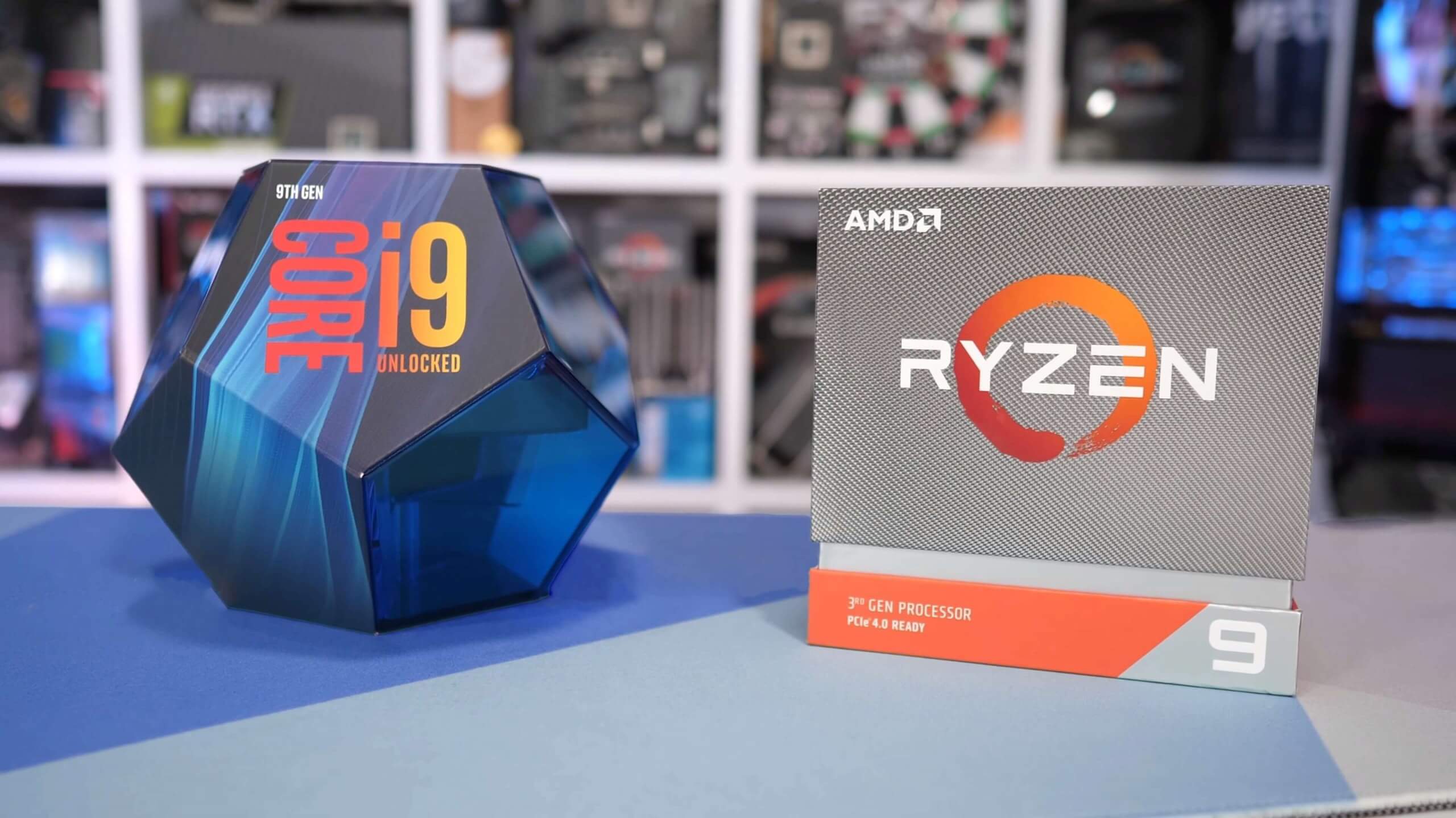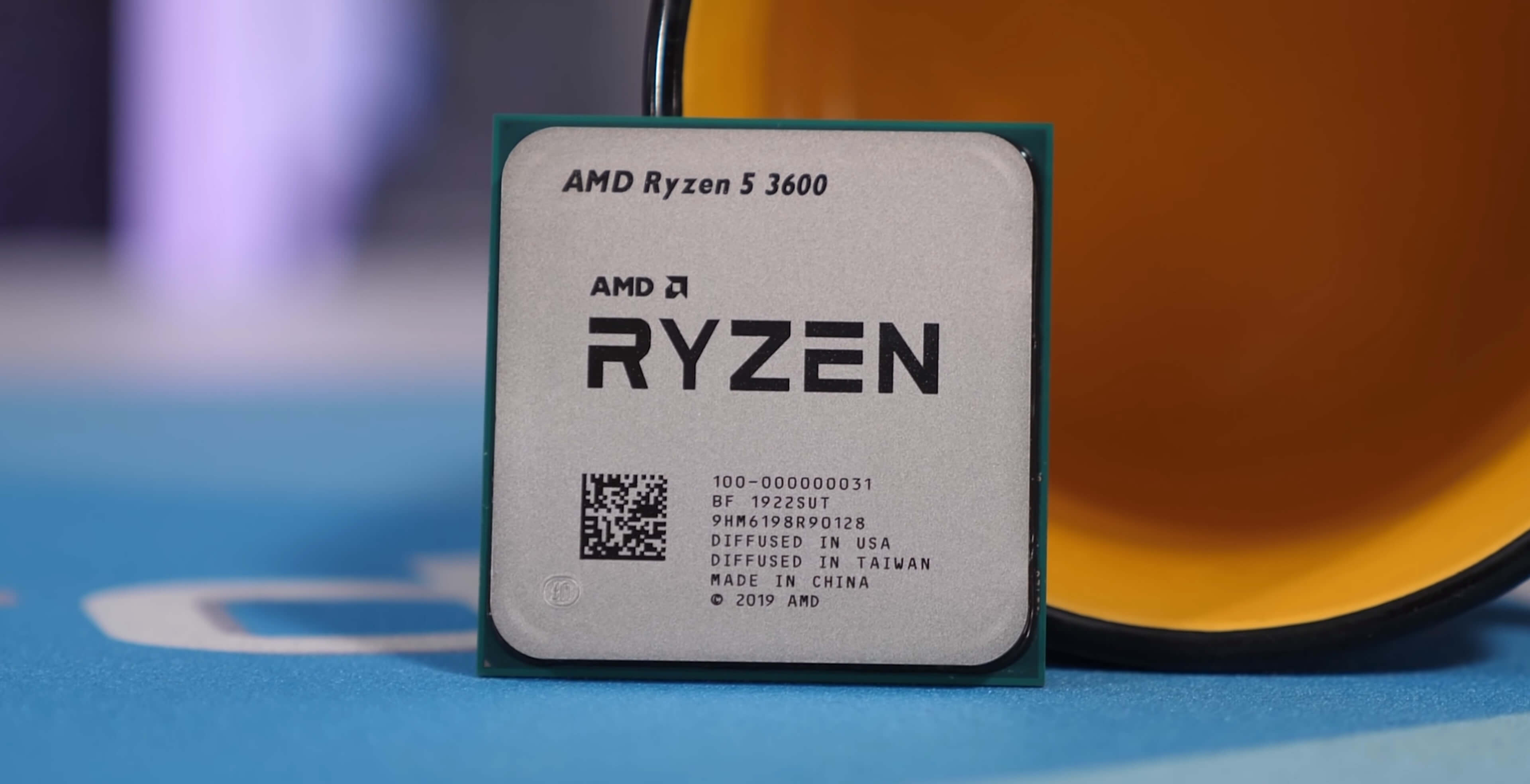Having tested 3rd-gen Ryzen processors with the GeForce RTX 2080 Ti extensively, our idea behind this new feature is to add mainstream and budget GPUs to the mix in a benchmark run that reflects more settings and resolutions gamers will likely use when tuning their PCs for gaming. As such we picked the RTX 2070 Super, Radeon RX 5700 and the now sub-$200 Radeon RX 580, to make for a decent spread of GPUs which also are among our favorites in the Best Graphics Cards 2019.
Moreover, rather than simply testing the more theoretical 1080p resolution which helps avoiding bottlenecks in graphics tests, we have added 1440p results as well. As for quality settings, we didn't stick to the usual ultra-type settings, instead finding it convenient to cover ultra, high and medium type presets for the purpose of showing scaling results.
All up this leaves us with four GPUs to test at two resolutions with three quality presets. That means that for each CPU, every game tested will require 72 benchmark runs, reporting an average of three runs for each test. Our three CPUs of choice are two top contenders from Intel and AMD – the Core i9-9900K and Ryzen 9 3900X – and what we consider the best value CPU available, the $200 Ryzen 5 3600. With four games selected, that puts us near the 900 benchmark run mark, which took just over three 16 hour sessions of doing nothing but benchmarking to get this data – let's share Steve's pain for a second.
The games we chose for this test are Rainbow Six Siege, Assassin's Creed Odyssey, Far Cry New Dawn and World War Z. Our test system used G.Skill's FlareX DDR4-3200 CL14 memory with the Corsair H115i Pro installed. Auto overclocking features such as MCE or PBO were disabled, so the results are out of the box performance for this hardware normalized by using some quality cooling. Let's get into the results!
Benchmarks
First up we have the 1080p ultra quality World War Z results. With the RTX 2080 Ti we see the exact same 1% low performance than with the 9900K and 3900X which isn't what you'd expect to see based on the results with the RTX 2070 Super and RX 5700 as the 9900K was 3-4% faster with these slower GPUs. The 9900K was also 4-5% faster when looking at the average frame rate with the 2080 Ti and 2070 Super and that margin is reduced to just 3% with the RX 5700.
Then as we drop down to the RX 580 which is still pushing well over 100 fps at 1080p, all three tested CPUs deliver basically the same performance. It's interesting to note that the 3900X was 6% faster than the 3600 with the RX 5700 and that margin only grew to 8% with the RTX 2080 Ti as we weren't far off being CPU bound even with the RX 5700 at 1080p.
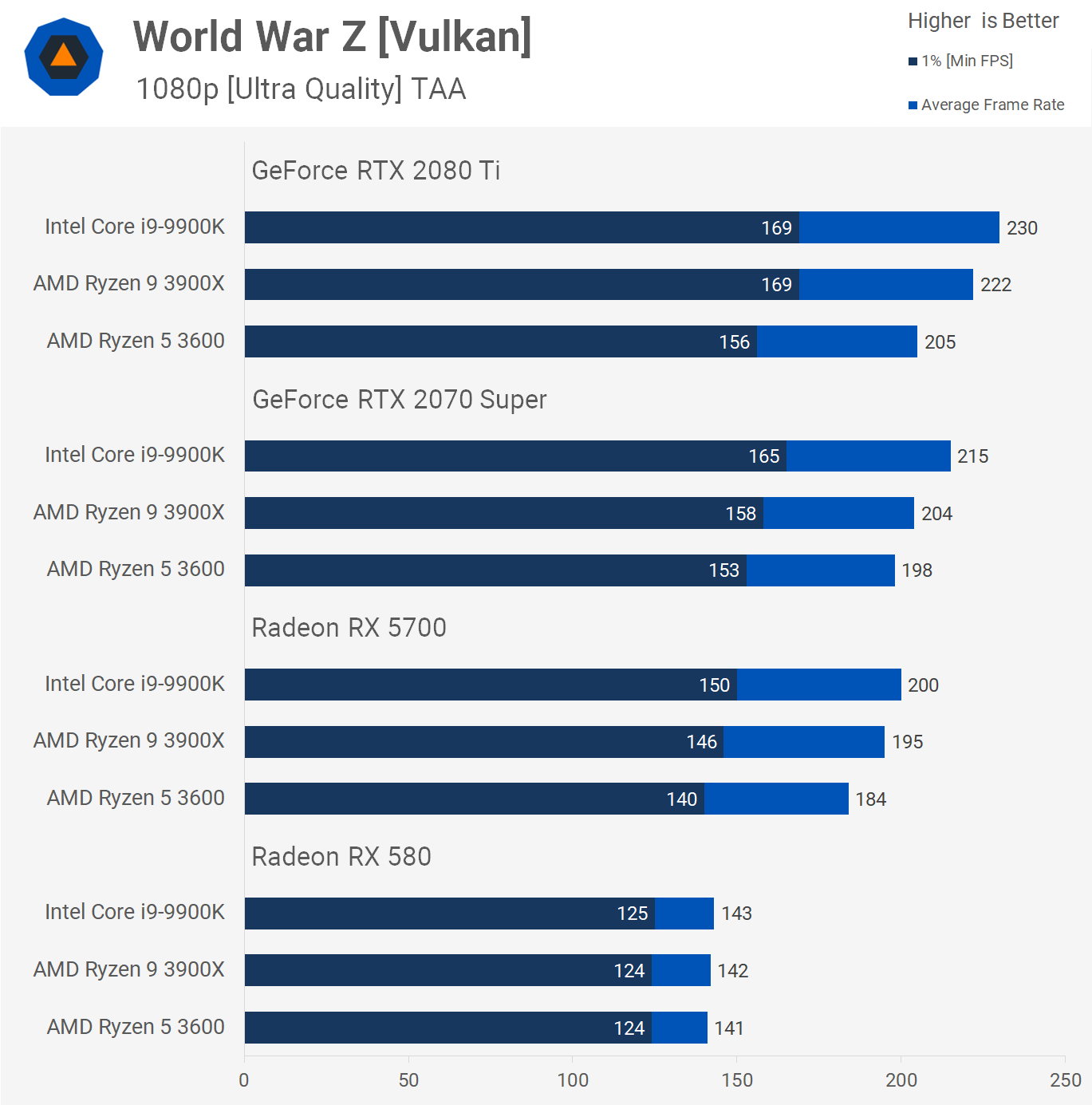
Moving to 1440p sees the RTX 2080 Ti pull comfortably away from the RTX 2070 Super and RX 5700. We do see a few oddities though when comparing the RX 5700 and RTX 2070 Super data. If we look at the 2070 Super it seems like Intel is being favored here, as both the 3900X and 3600 are limited to around 170 fps. In contrast to this, the RX 5700 allows the 3900X to match the 9900K, while the 3600 drops off here.
With the RTX 2080 Ti we see that the 3600 finds its limits in regards to 1% low performance and interestingly the 3900X and 9900K are now more evenly matched than they were with the RTX 2070 Super. As expected though, given what we saw at 1080p, the RX 580 creates a strong GPU bottleneck that neutralizes any and all margins.
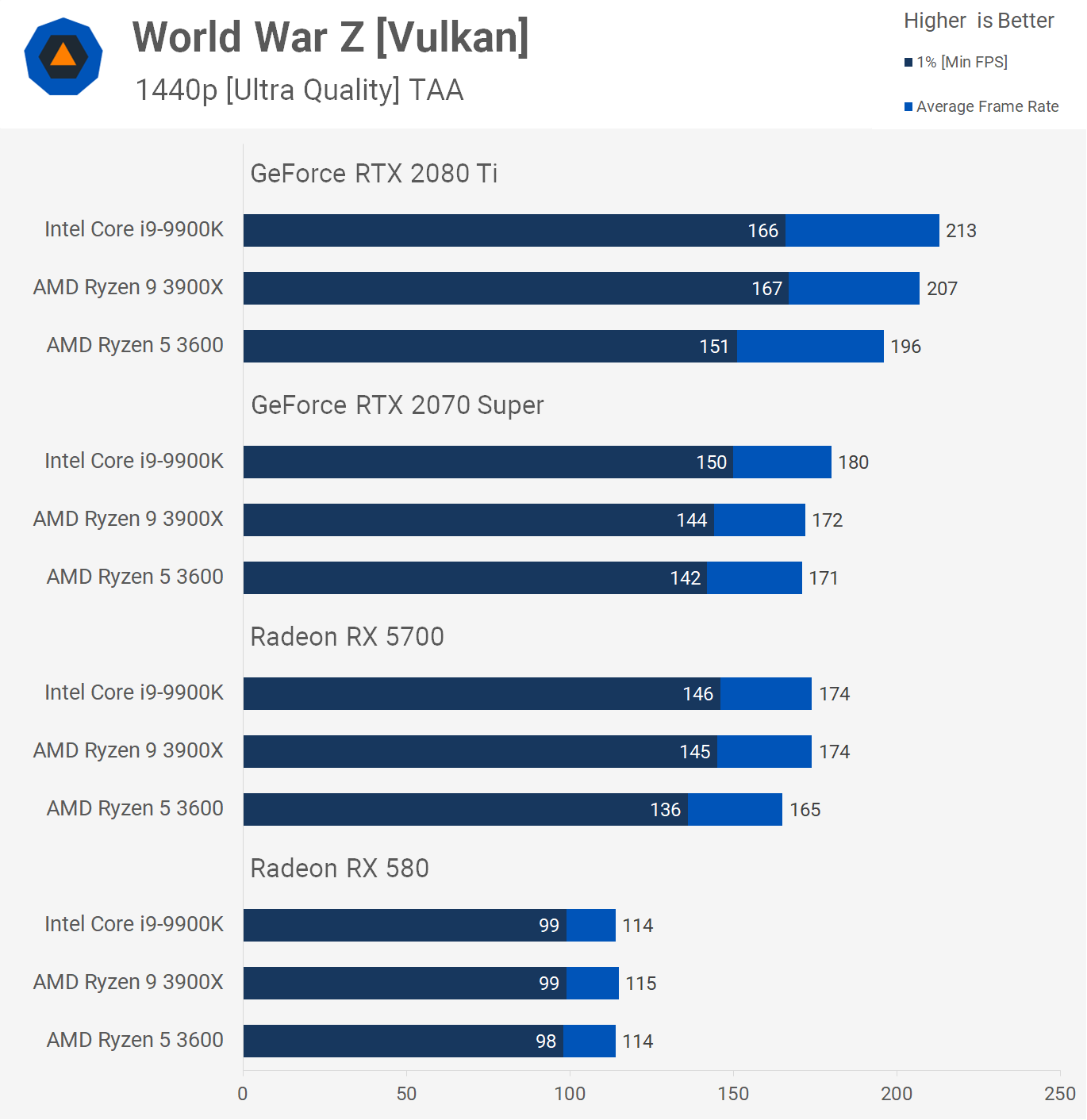
Lowering the quality preset to high sees very little change in performance to what was seen with ultra quality and the margins all remain much the same.
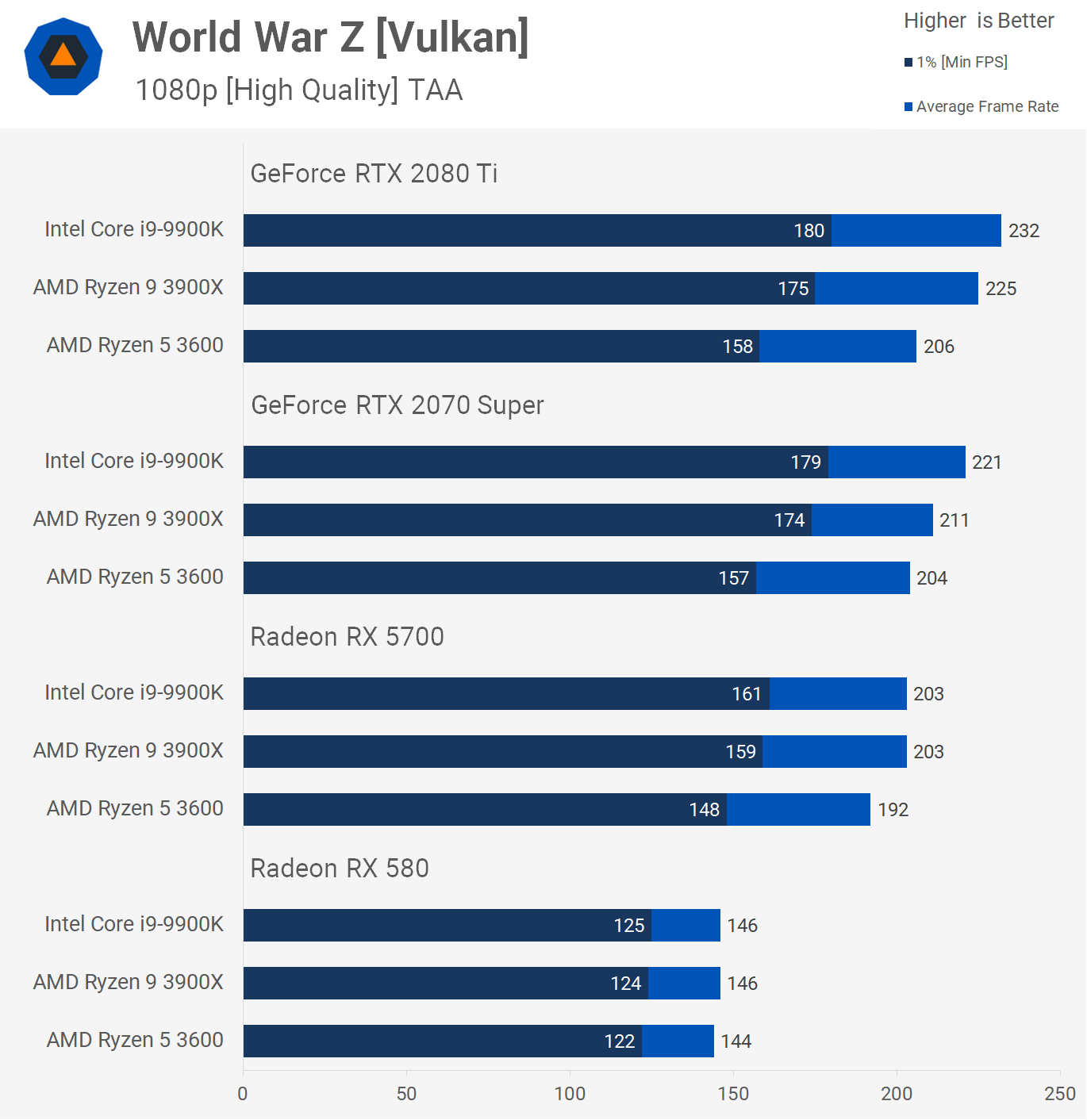
We see a mere 5-10 fps drop at 1440p from ultra to high and again this had no real impact on margins and we're still seeing the same odd scaling between the RTX 2070 Super and RX 5700.
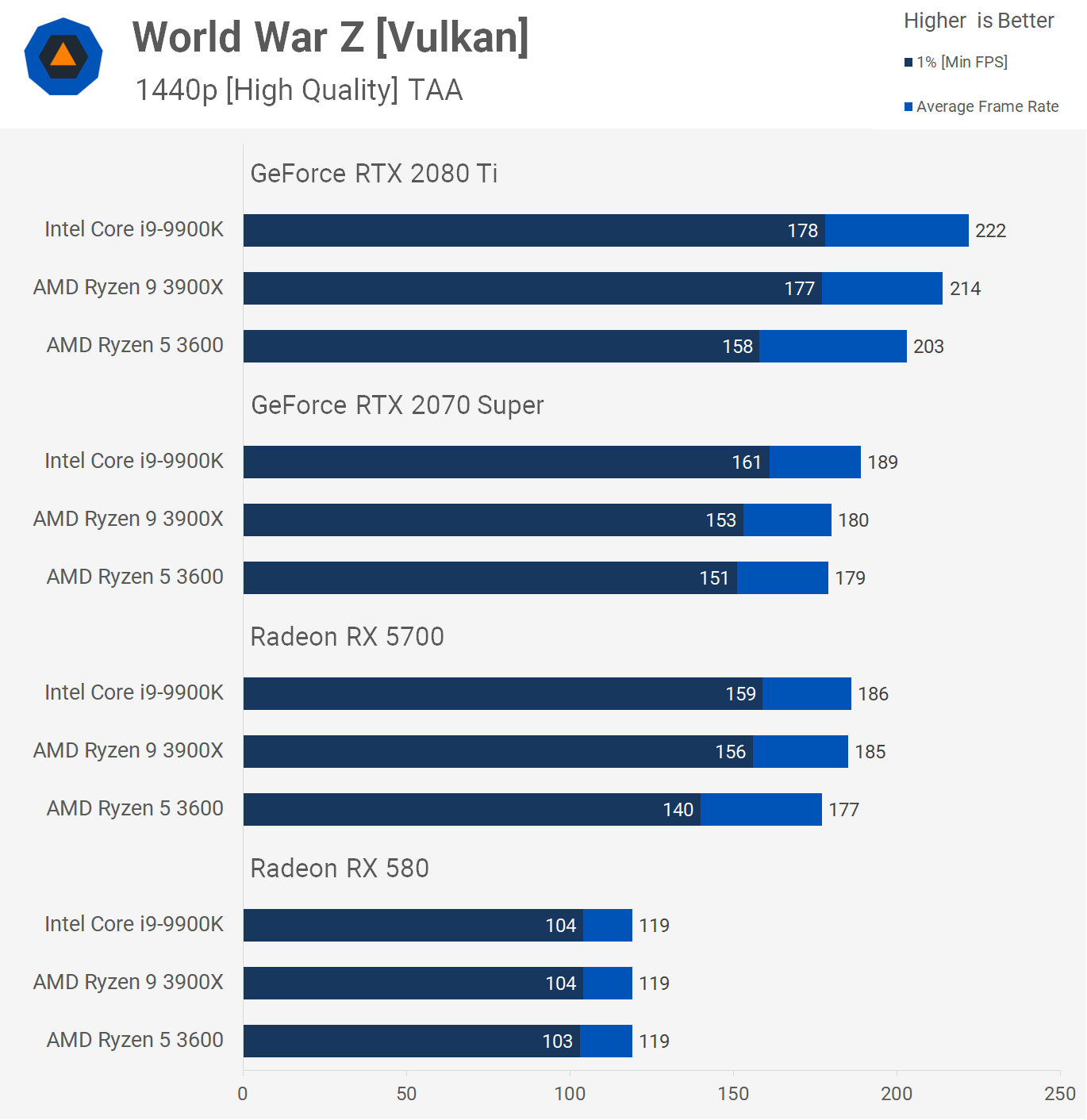
Even dropping down to medium graphics settings didn't boost performance by much. We're only seeing 10-20 fps gains over ultra. As for the margins, they're all quite similar though with the extra headroom we are starting to see some change in performance with the RX 580, the 9900K was 5% faster than the 3600, for example.
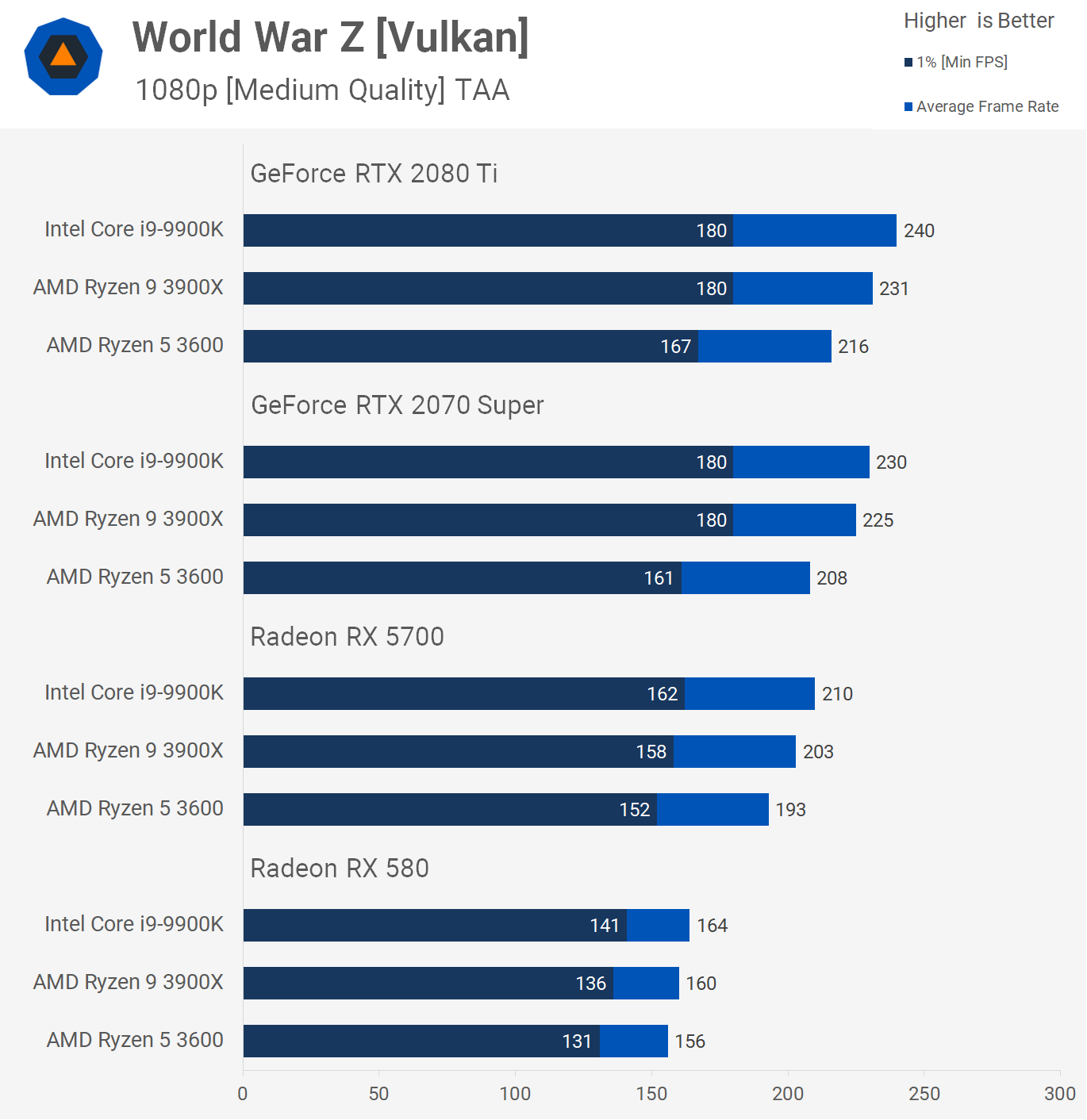
World War Z at 1440p medium settings test shows similar scaling to the 1440p ultra results. The most interesting thing here is how much the R5 3600 drops away when using the RX 5700, something we don't see with the RTX 2070 Super. This is again seen with the RTX 2080 Ti, but these results make a bit more sense as the faster GPU enables the faster CPUs to push higher frame rates.

Moving on to some Far Cry New Dawn testing and first up we have the 1080p ultra results. As you can see we're very much CPU bound at 1080p, even with the RTX 2070 Super. The 1% low performance is similar with the RX 5700, but it doesn't push averages quite as high.
Once we drop down to the RX 580 we're almost entirely GPU bound and as a result all three CPUs delivered a similar result.
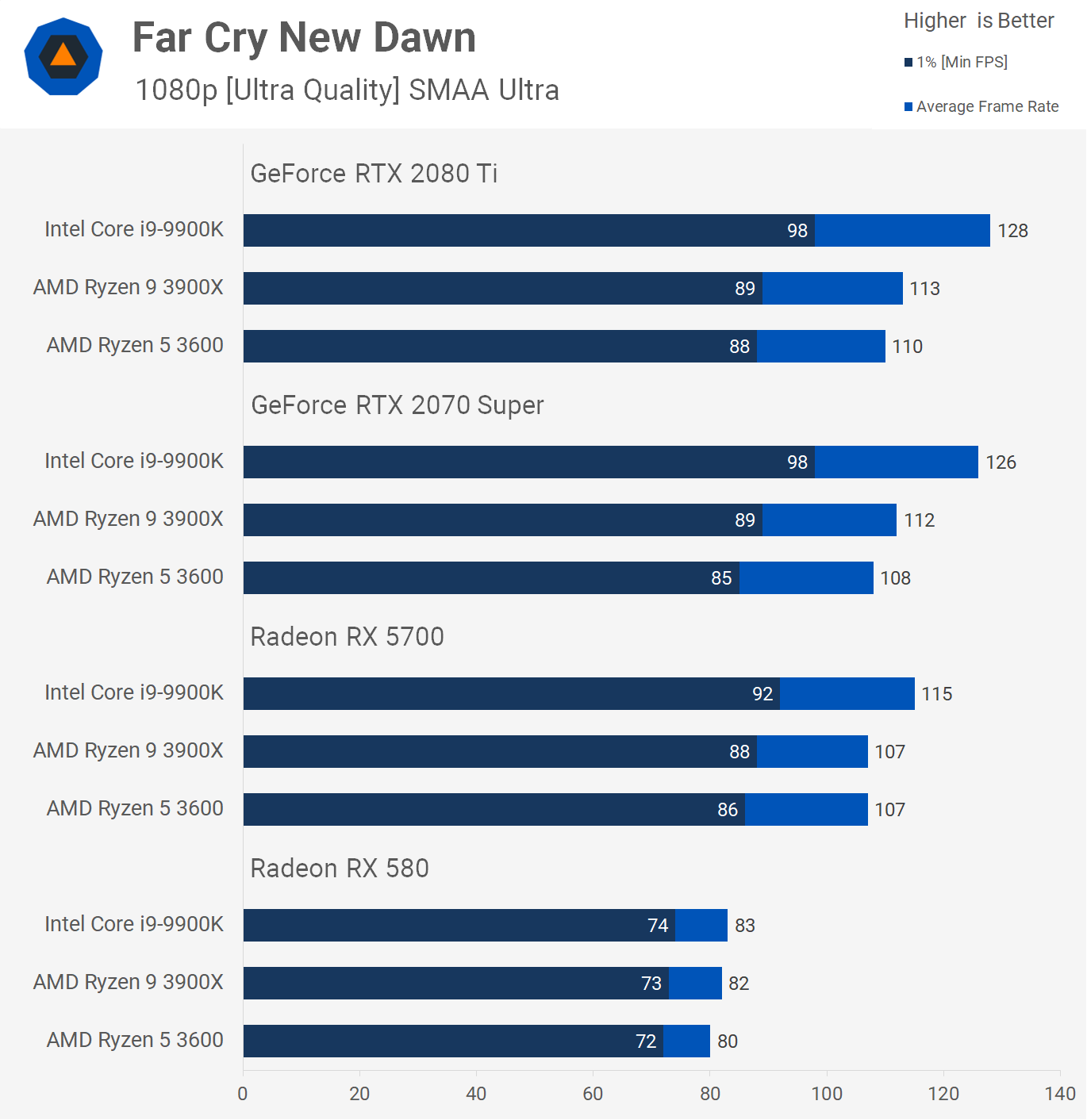
At 1440p the margins are similar with the RTX 2080 Ti, but they close up a little with the RTX 2070 Super. Also as expected very little difference between the two CPUs can be seen with the RX 5700 and again we find the exact same performance with the RX 580.

With the high quality preset we're again heavily CPU bound with the RTX 2080 Ti and 2070 Super installed and it's a similar situation with the RX 5700. This allowed the 9900K to provide 15% more performance, even with the 5700.
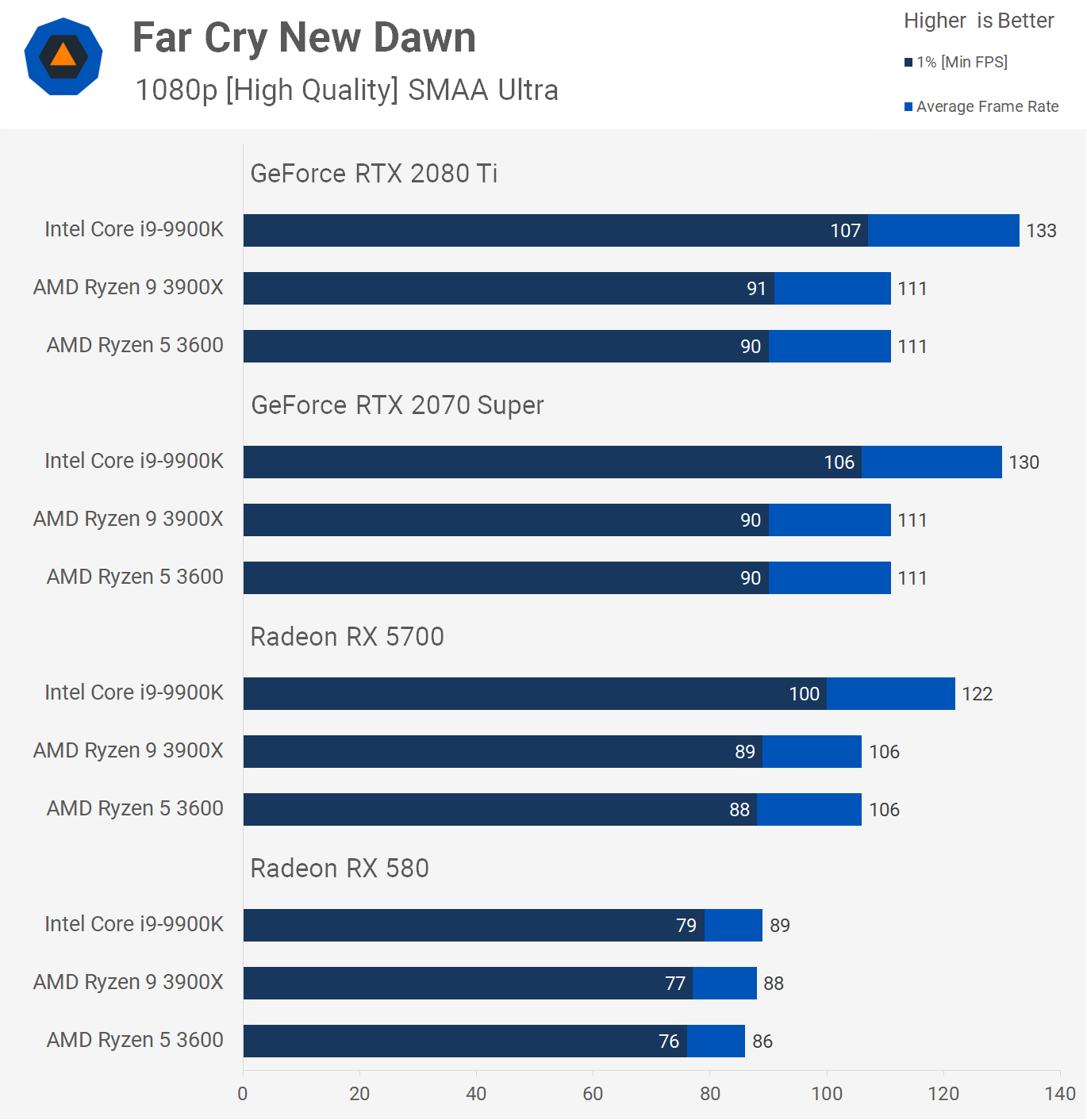
Moving to 1440p sees similar margins between the 3900X and 3600, so basically the same level of performance with all four GPUs. The 9900K is again 15% faster with the 2080 Ti and this time 13% faster with the 2070 Super while the margin is reduced to 9% with the RX 5700, and of course, the same performance is seen with the RX 580.

Finally with the normal quality preset enabled we see pretty much the same performance from the 3900X and 3600 at 1080p using the RX 5700, 2070 Super and 2080 Ti. Meanwhile, the 9900K enables mild performance gains, seeing a 6% boost from the 5700 to the 2070 Super and then 4% from the 2070 Super to the 2080 Ti.
The 9900K was also up to 24% faster than the Ryzen processors at this low resolution using these mild quality settings, but again with an RX 580 there was virtually no margin to be seen.
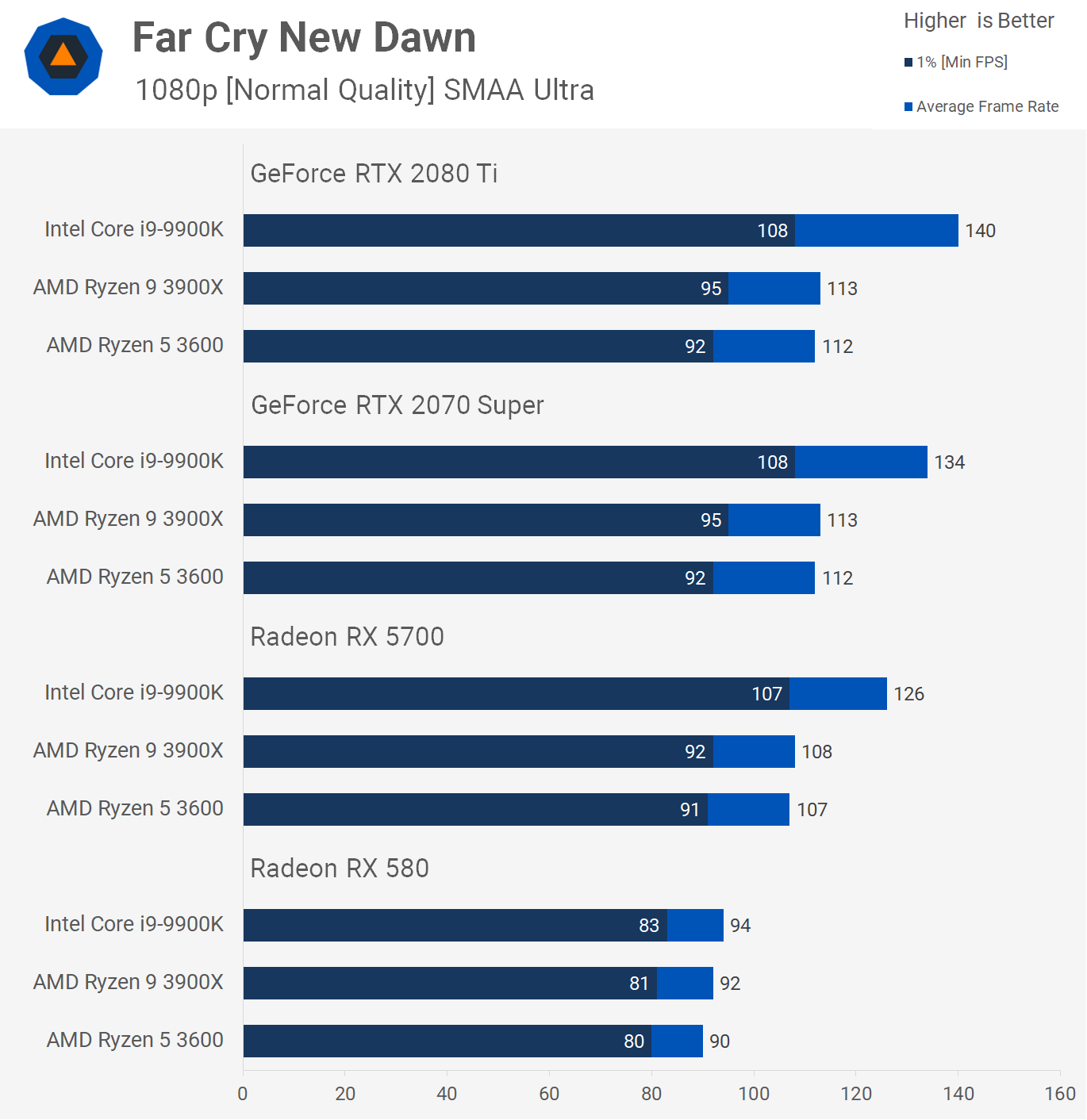
Then at 1440p the 9900K was up to 18% faster with the 2080 Ti, 14% faster with the 2070 Super, 10% faster with the RX 5700 and no faster with the RX 580. Remember this is a worst case scenario for Ryzen which is one of the reasons we wanted to include this game as part of the test suite.
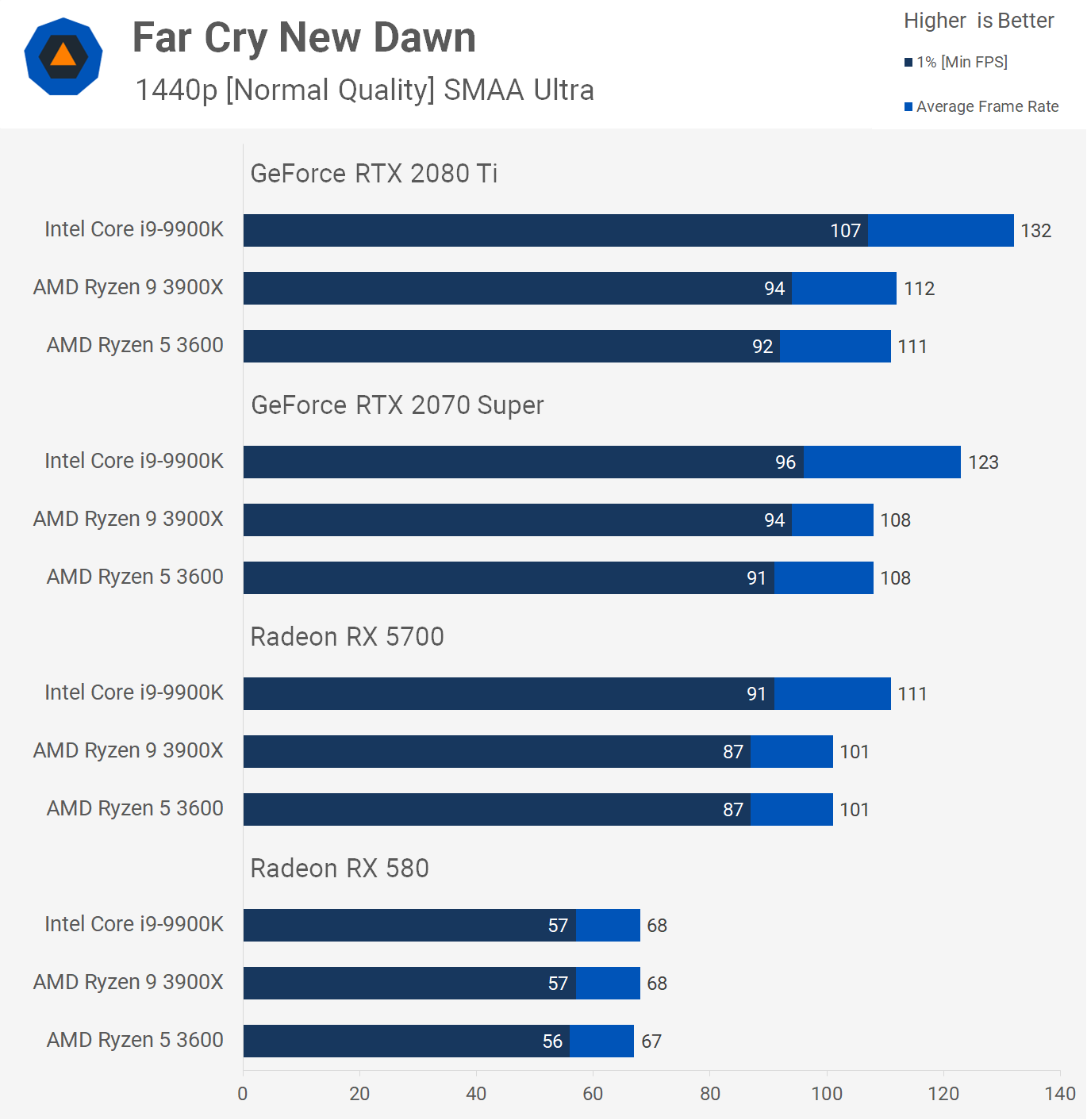
Moving in the opposite direction we have one of the best case scenarios for Ryzen in Assassin's Creed Odyssey. Here we see the 1% low performance of the Ryzen 5 3600 max out with the RX 5700, though we do see an increase in average frame rate as we step up the GPU power.
The 3900X manages to just beat the 9900K for 1% low and average frame rate performance using the RX 5700, 2070 Super and 2080 Ti.
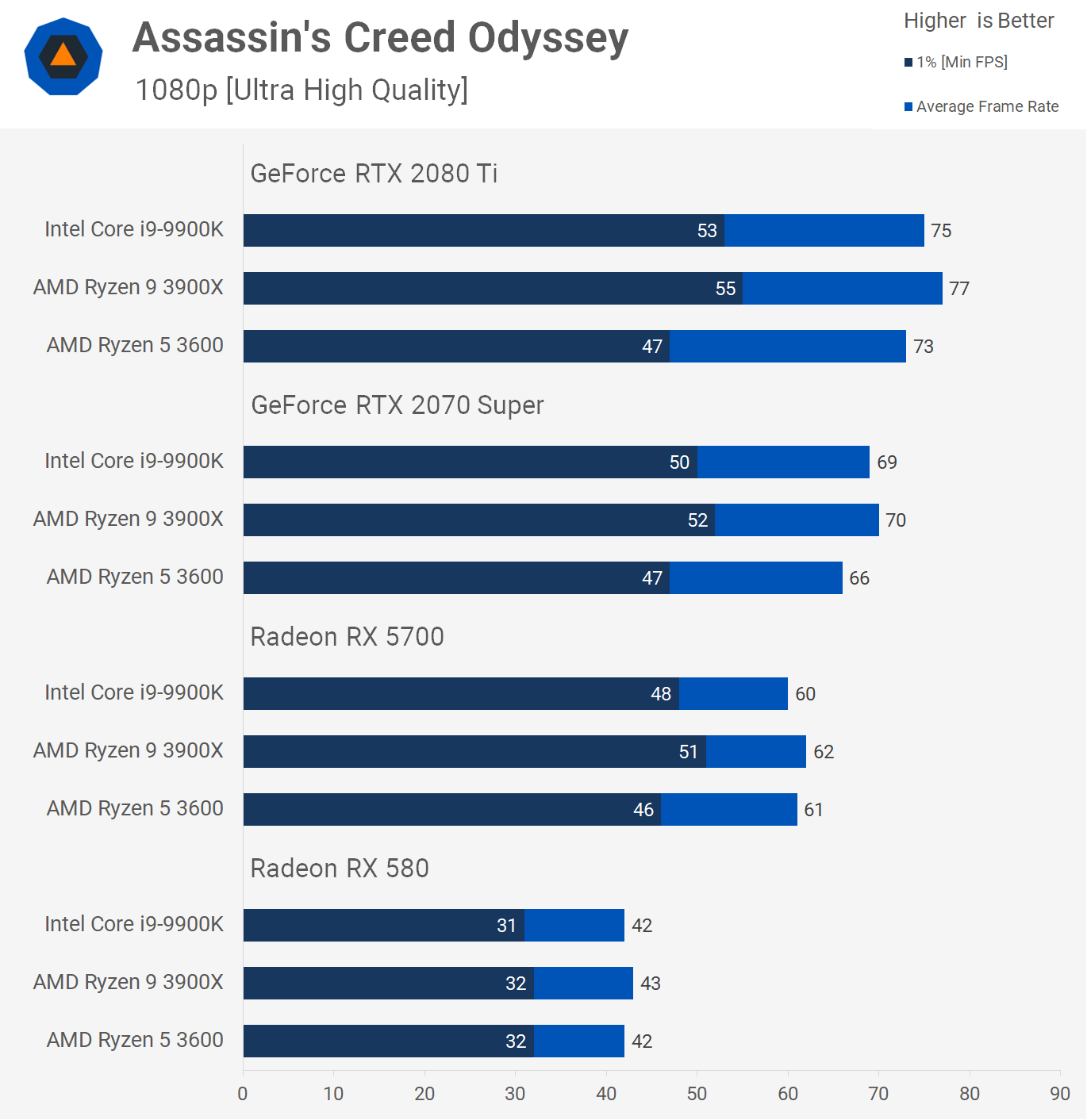
Increasing the resolution to 1440p reduces the margins for the most part, though we do still see the 3900X punching ahead with the 2080 Ti for 1% low performance. This time we also see the R5 3600 dropping off a little with the RX 5700, something we didn't see when using the RTX 2070 Super.
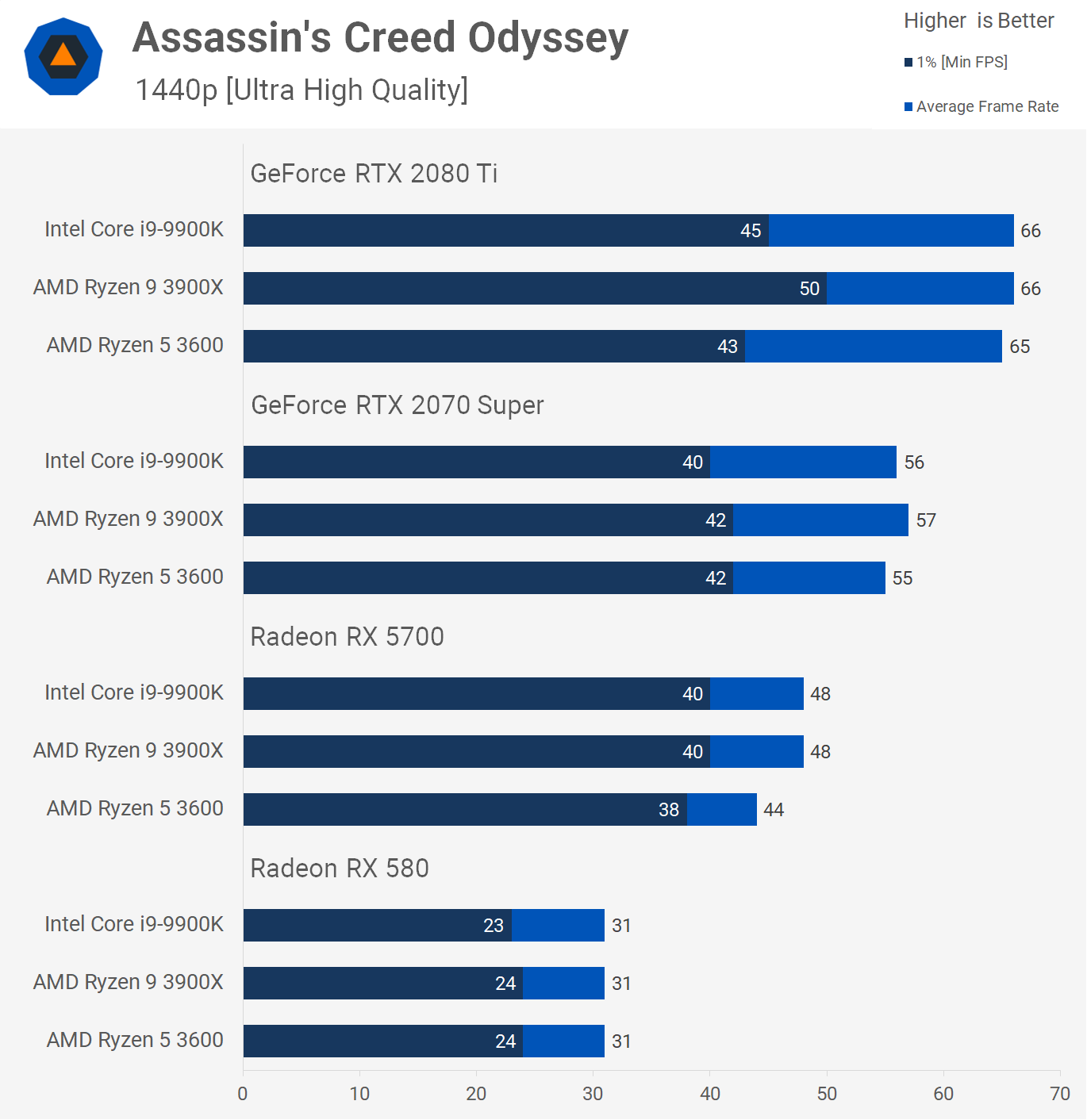
Reducing the quality level to the very high preset sees very even performance with the 2070 Super and RX 580. The RX 5700 seems to slightly favor the 9900K and we see a similar thing with the RTX 2080 Ti which is interesting.

Moving to 1440p sees margins remain roughly the same, again the 9900K enjoys a very small performance advantage with the RTX 2080 Ti and this isn't seen with the 2070 Super or RX 5700.
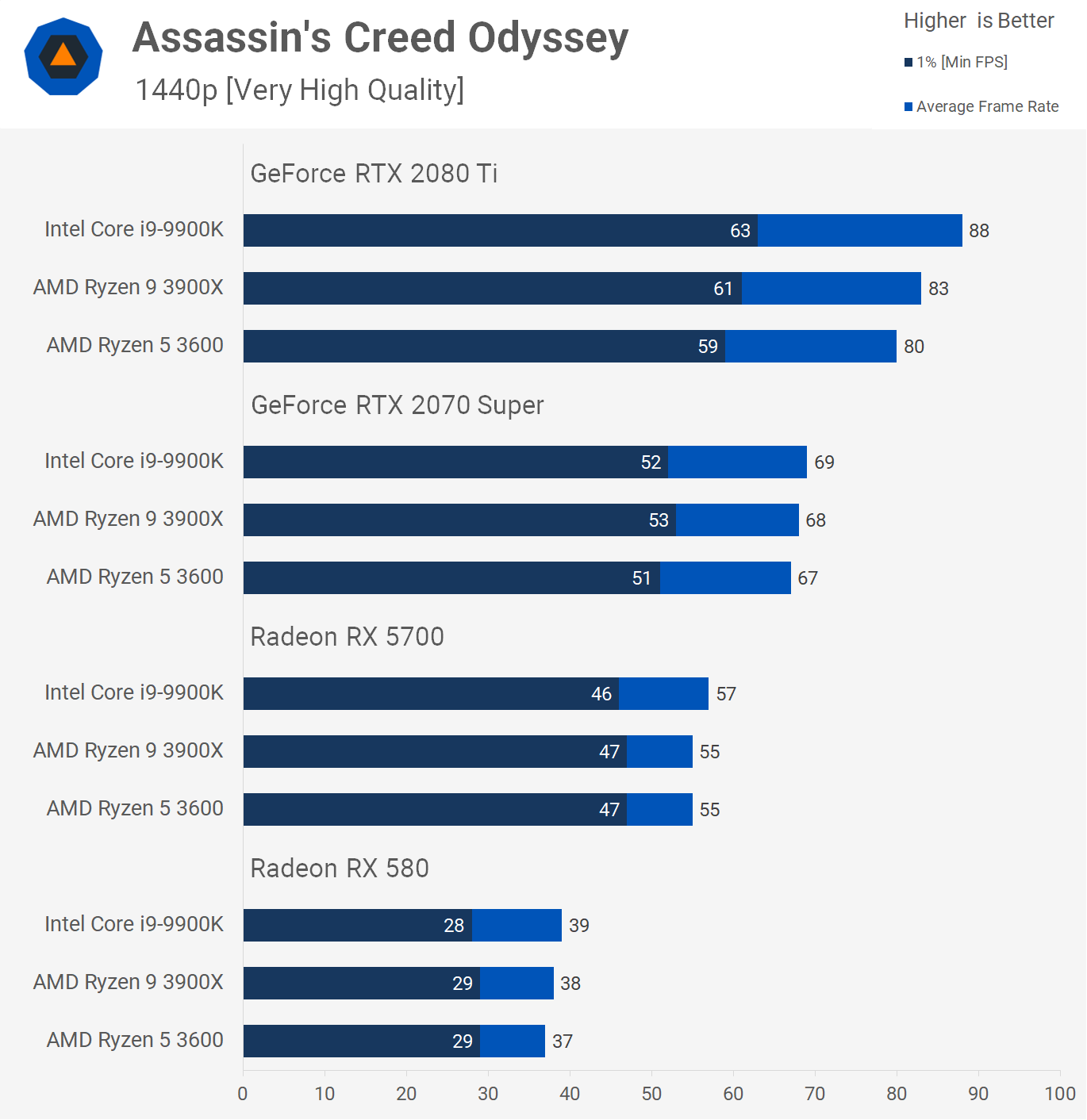
We skipped the 'high' preset as performance was virtually identical to 'very high' and instead dropped down to the 'medium' preset. Here the R5 3600 falls off a little with the 2070 Super and RX 5700 at 1080p, which is odd as it didn't struggle nearly as much with the RTX 2080 Ti. We even see a very minor performance drop when using the RX 580, though we're only talking a 4% decrease from the 3900X.
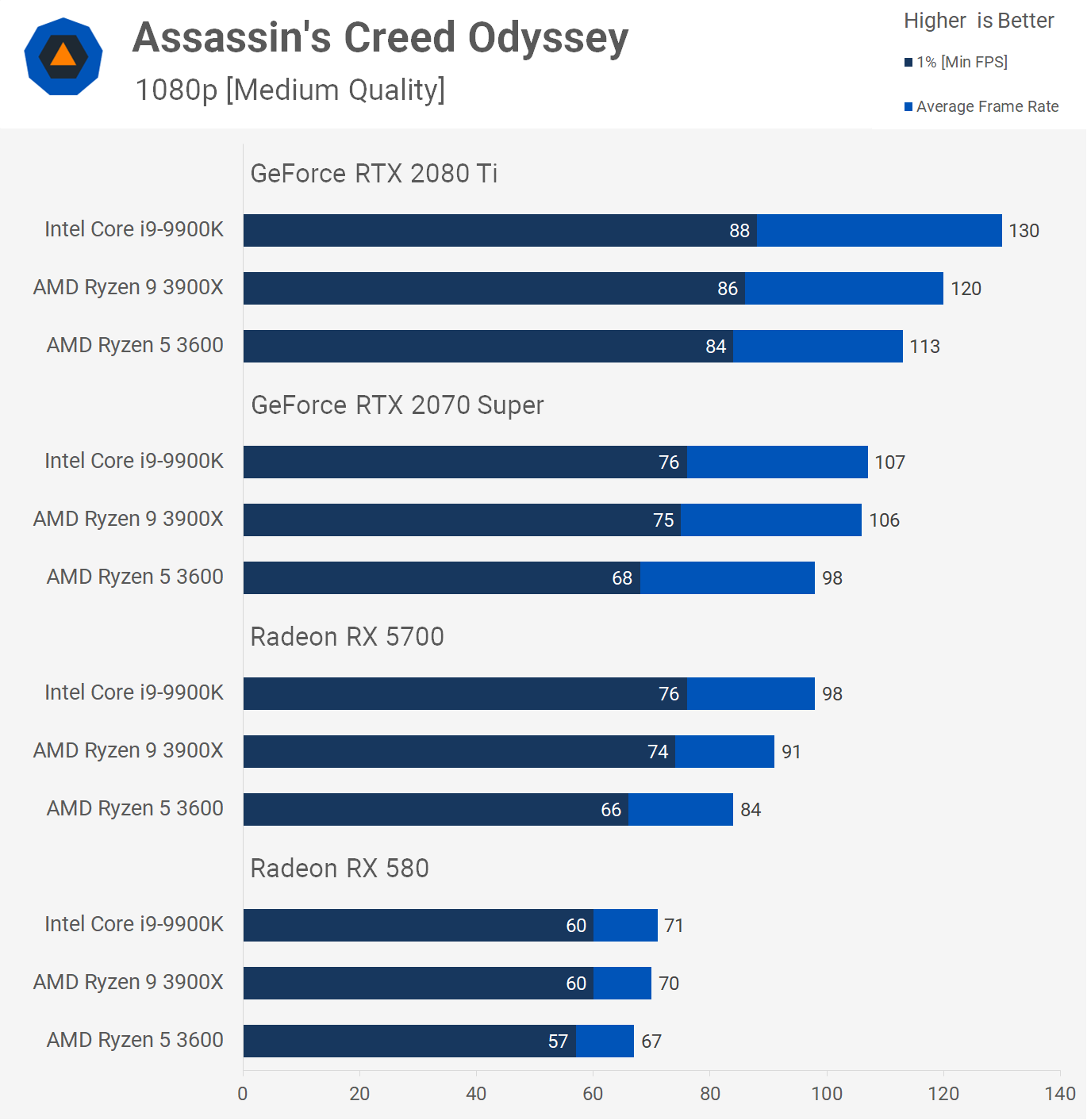
Things get a little crazy at 1440p. The R5 3600 drops off quite a bit when looking at 1% low performance while the 3900X charged ahead of the 9900K when using the RTX 2080 Ti. It's very interesting to see the 9900K go from being 10 fps faster at 1080p to a few fps slower at 1440p and quite a bit down for the 1% low result. We have seen this from time to time in the past and it seems in these CPU demanding titles the added load of a higher resolution can favor CPUs with more resources. Overall though the 3900X and 9900K were evenly matched.
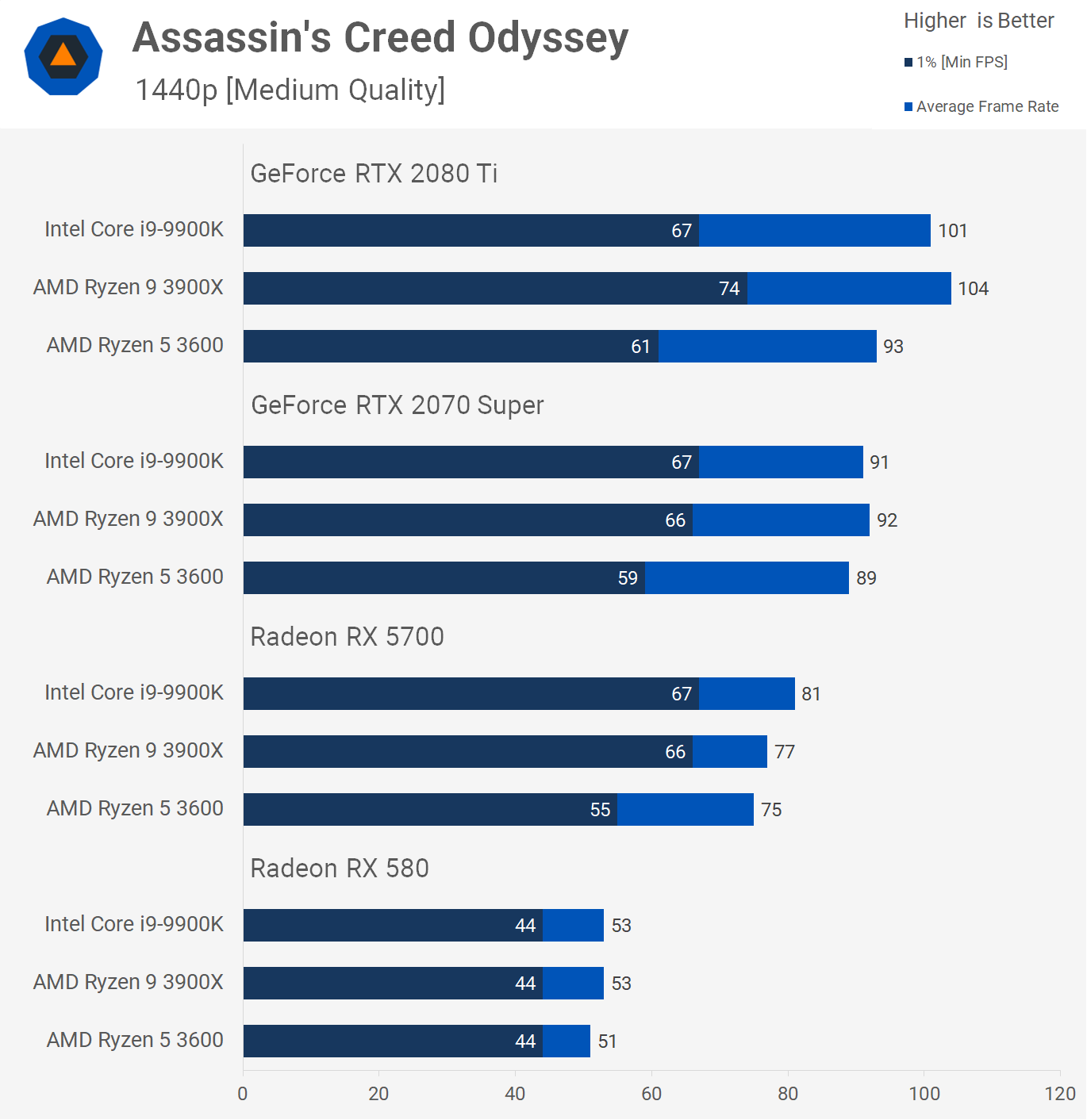
The last game tested is Rainbow Six Siege. First up we have the ultra quality results at 1080p where the 9900K enjoys a small 4-6% performance advantage when using the RTX 2080 Ti and 2070 Super. That margin eroded to nearly nothing with the RX 5700 and we're still pushing over 150 fps on average. Then with the RX 580 there are no margins to speak of.

Jumping up to 1440p sees no difference in performance with both the RX 580 and RX 5700. Meanwhile the 9900K was just 5% faster using the 2070 Super and 4% faster with the 2080 Ti.
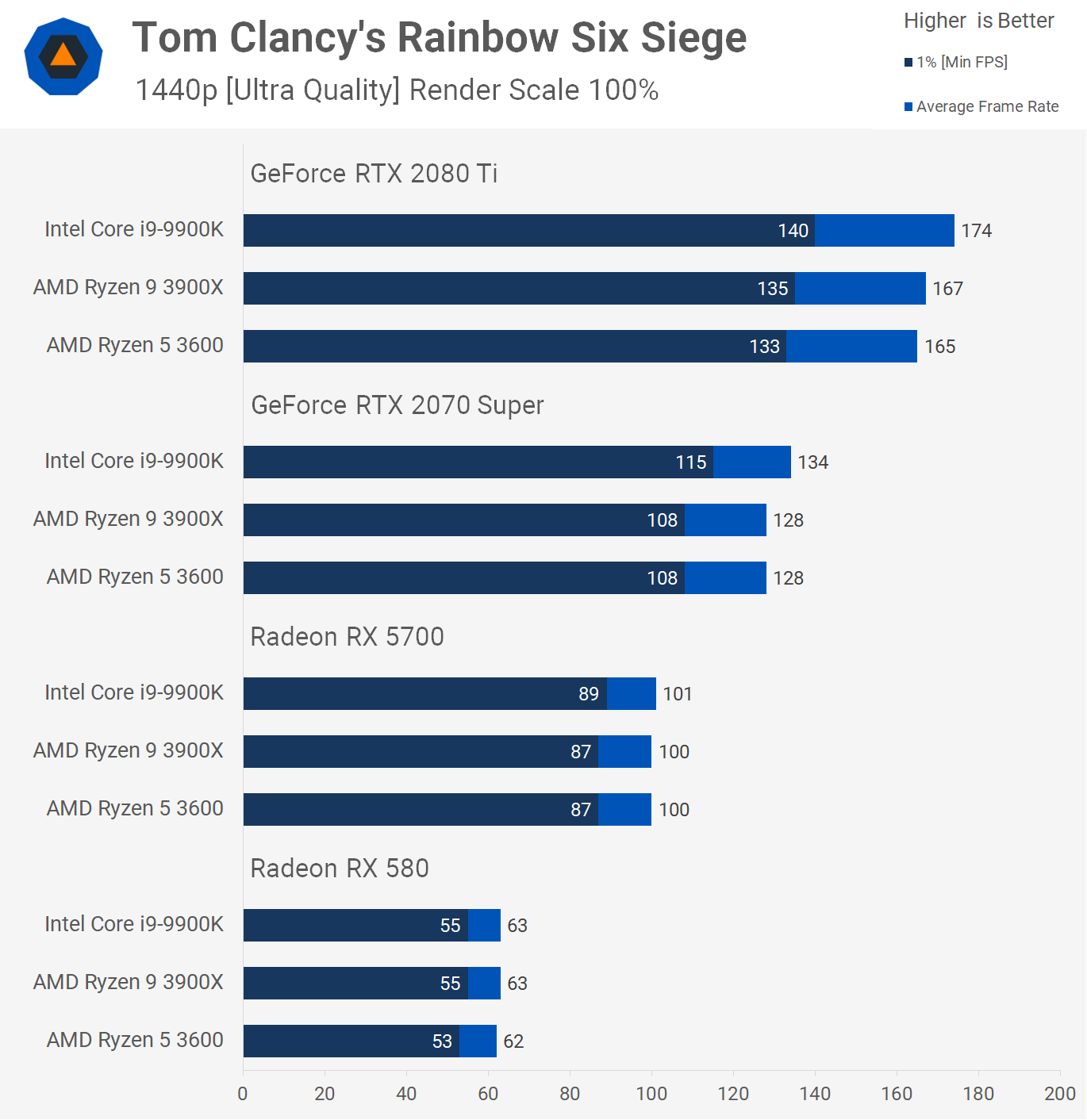
Dropping down from ultra to very high sees the same margins with the Radeon GPUs, while the 9900K enjoys a slight performance advantage with the 2070 Super and a reasonable performance advantage with the 2080 Ti.
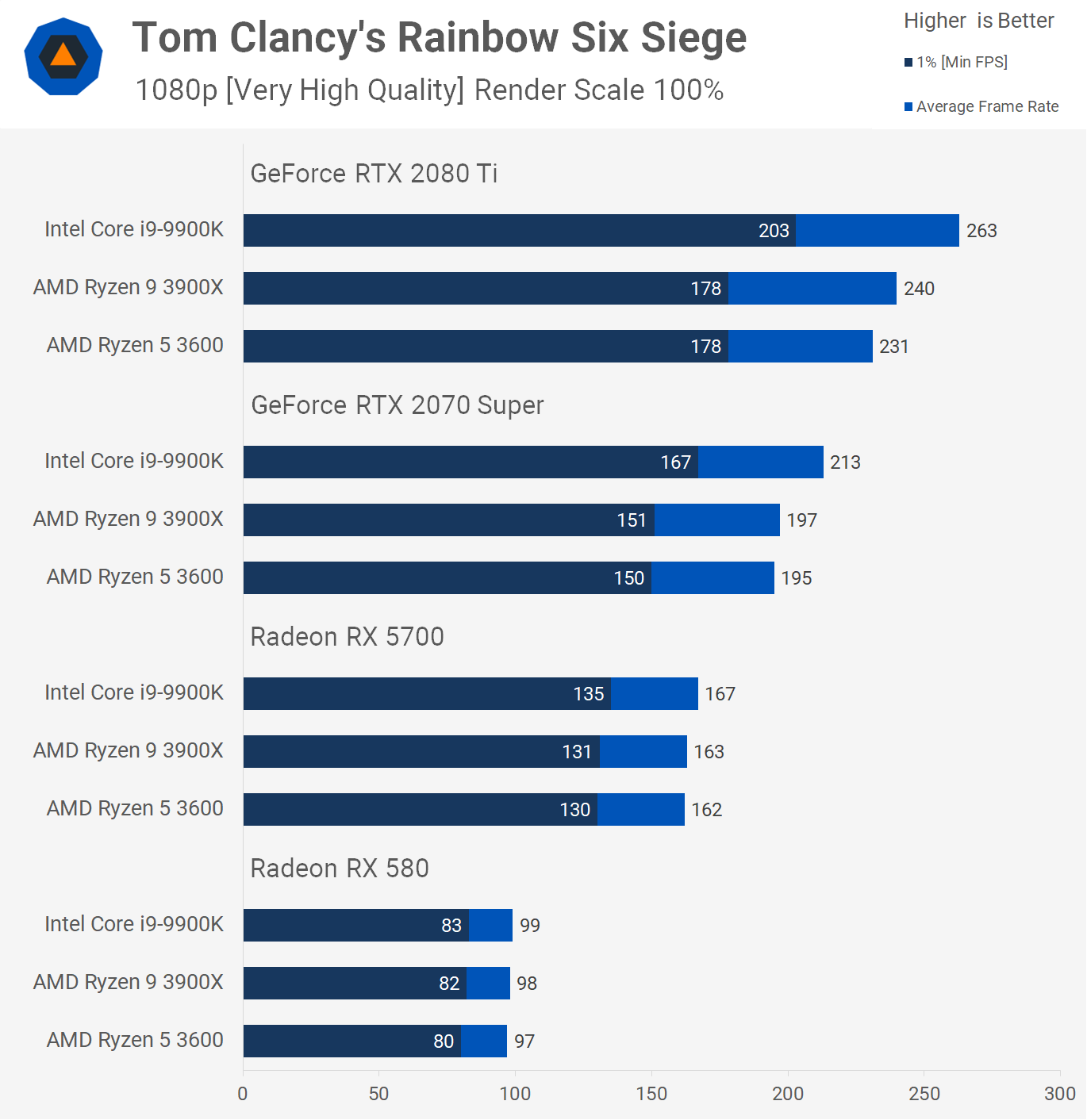
The margins are much the same at 1440p between the ultra and very high presets. The Core i9 9900K shows a performance advantage when using the RTX 2070 Super or anything faster.

Lowering the quality preset to High extends Intel's lead with the 2080 Ti at 1080p. Now it's 10% faster than the 3900X for the average frame rate, pushing well over 200 fps. It was also 14% faster when looking at 1% low performance. For 144 Hz gamers even the 3600 was good for over 170 fps at all times when using a very fast GPU where is most of the load resides.
Margins with the 2070 Super were similar but once you hit a GPU limit the margins are neutralized with the RX 5700 and below.
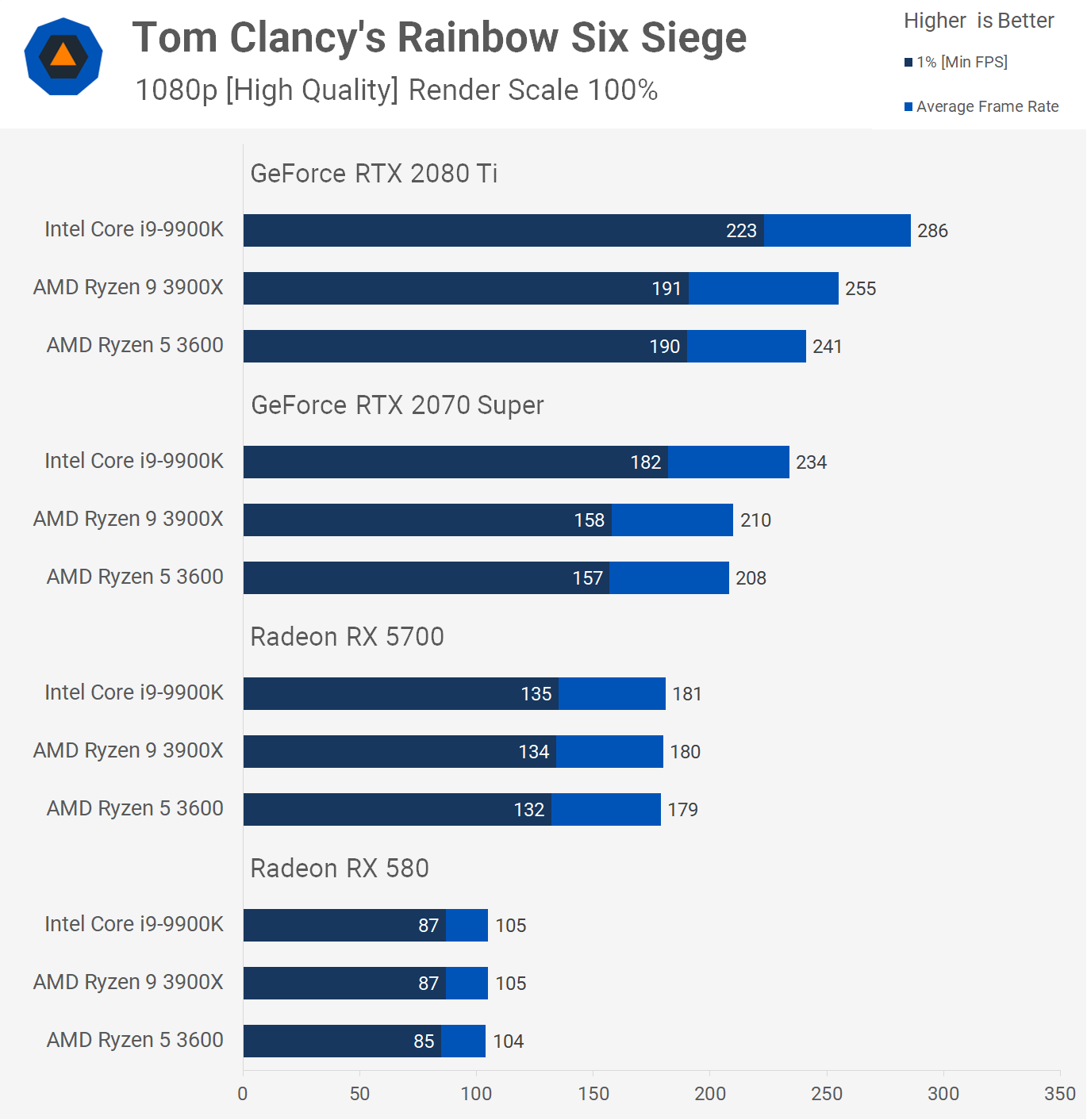
The 1440p ultra and high results show much of the same. The margins with the 2070 Super and 2080 Ti are extended ever so slightly in Intel's favor, but not exactly anything to write home about given we're pushing over 130 fps at all times with the 2080 Ti regardless of the CPU used.
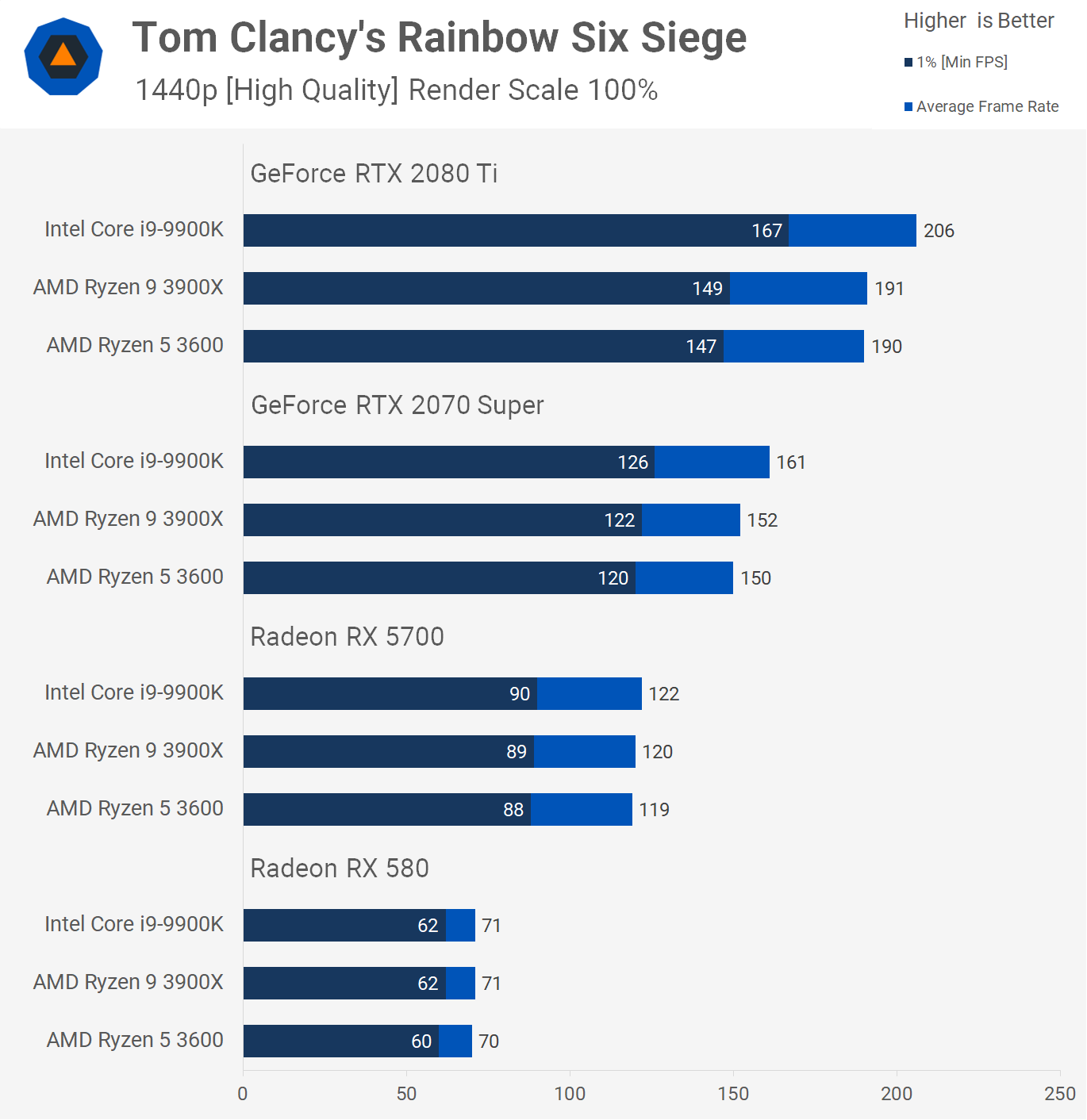
Putting It All Together
To wrap up the test we'll quickly look at the average performance across this 4 game sample. Using the RX 580, the 9900K was 1% faster than the 3900X, so within the margin of error and needless to say they both delivered the same gaming experience with that particular GPU that is underpowered for the modern high-end CPUs. The 9900K offered a 3% performance boost with the RX 5700 which still shows a GPU limitation scenario.
With the RTX 2070 Super we start to see a larger gap. The 9900K was on average 6% faster though we're not sure you'll notice the jump from 144 fps to 153 fps. Then with the 2080 Ti the 9900K was 5% faster on average, this time jumping from 161 fps to 169 fps. Needless to say, these two high powered CPUs are great for gaming (further reading: Ryzen 9 3900X vs. Core i9-9900K: 36 Game Benchmark)

For those playing at lower quality settings we saw the 9900K enjoy a 5% performance advantage with the RX 5700 using the medium quality settings. Then it was 7% faster on average with the 2070 Super and 11% faster on average with the 2080 Ti.
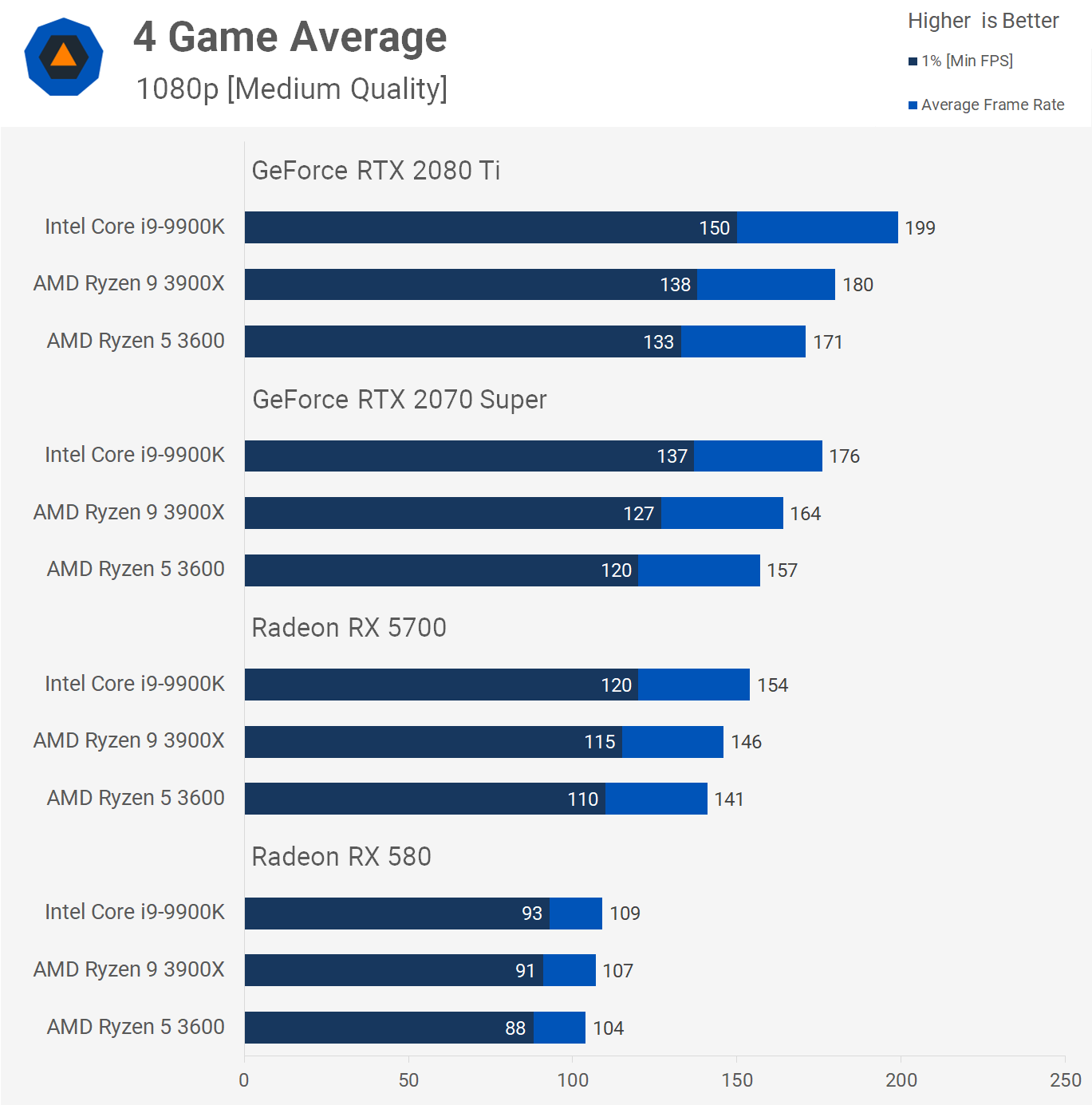
After a shipload of testing, we haven't learned anything particularly new but it does cover all angles of gaming performance, CPU, and GPU scaling on a single article.
For the most part you're not going to see much difference between the 3900X and 9900K with an RX 5700 or RTX 2060, for example. There is some separation depending on the title with an RTX 2070 Super, but even so for titles such as Rainbow Six Siege where the 9900K was a good bit faster using mid-range quality settings at 1080p, that margin was heavily reduced at 1440p and with even the Ryzen 5 3600 allowing for averages well in excess of 144 fps, you have to wonder how much it really matters.
If you're looking at spending less than $700 on a graphics card, buying a Core i9-9900K or Ryzen 9 3900X, purely for gaming isn't a great investment, you're far better off with something like the R5 3600. In fact, purely for gaming I wouldn't recommend either the 9900K or 3900X unless you're dumping $1,000 on an RTX 2080 Ti.
The Ryzen 5 3600 really is the go to processor right now. We'd even recommend skipping over the 3700X, purely for gaming, as high performance 8-core/16-thread processors won't be fully leveraged in games any time soon and the $130 you save now, can go towards an upgrade when you actually need it, many years down the track.
Shopping Shortcuts:
- AMD Radeon RX 5700 XT on Amazon, Google Express
- AMD Radeon RX 5700 on Amazon, Google Express
- GeForce RTX 2080 Ti on Amazon, Google Express
- GeForce RTX 2070 Super on Amazon, Google Express
- GeForce RTX 2060 Super on Amazon, Google Express
- AMD Ryzen 9 3900X on Amazon, Google Express
- AMD Ryzen 5 3600 on Amazon, Google Express
- Intel Core i9-9900K on Amazon, Google Express
- Intel Core i5-9600K on Amazon, Google Express
- Intel Core i5-9400F on Amazon, Google Express
Masthead credit: 3d rendered CPU concept by Blue Andy

